#or even the matrix! or or or ... really anything that features office-working characters
Text
Liu Chang in Overworking Man
😂😂😂 I'm dying, he's going to be SO MEMEABLE - if only there would be english subtitles 😢

[original text: #职场新人可以说不吗# #短剧滚动吧小齿轮#菜鸟杨可以@刘畅木法沙 携手鬼畜上司叶守愚@淮文Shawn 、奇葩同事林开心@文生 闯荡职场不停歇,成长治愈收获多!今日起@腾讯视频 @腾讯微视 全网独播,每周二三四12:00更新,会员抢先看6集! 短剧滚动吧小齿轮的微博视频]
#liu chang#overworking man#滚动吧小齿轮#i am agog - his is so GOOD at these reacts#yang ke really really is the downtrodden working stiff#it works perfectly for an au - like YES fodder for fox's brilliant scum villain transmigration au#BUT also like now i want (heh) a wanted au (if movie version then xiaoge can be the angelina jolie character!)#or even the matrix! or or or ... really anything that features office-working characters#you could have an office au with liu chang and kan jian as jim and pam! you could do office space! (liu sang and the red stapler)#idk just ALL the representations of crazy office shenanigans with dmbj characters#who would be most likely to photocopy their own backside? ok wait nevermind of course that's hei xiazi#and wu xie and xiaoge are that couple that keep having sex in the supply closet (and forgetting to lock it) and taking#'long lunches' with pangzi the *very* friendly local sales rep#oh!!!!!! o f f i c e x ia o h u a!!!! suddenly i desperately want ceo xiao hua/slightly skeezy it tech hei xiazi#or delivery guy hei xiazi??? showing up in the ceo's big luxurious corner office with his takeout like: lunch tea or me?#'here's your takeout or y'know .. you could take *me* out 😜' and xiao hua is like 'who let you in here?'#and bans him but the place he delivers from just has The Best jianbing - and of course it's *actually* corporate espionage#bc hei xiazi is just weirdly capable of solving the computer problem xiao hua was having after spotting it on his desktop#while draping himself across xiao hua's desk and well into his personal space - he's very ingratiating when he wants to be#and somehow i'm putting all of this in tags on a *liu chang* office comedy post okay. that. got away from me#i guess it's fitting i find liu chang so infinitely inspirational - it even works for *other* characters and ships lol
32 notes
·
View notes
Text
Leviticus, chapter 27
1. Smoke.
2. Indeed, at the time, to the roles ascribed, as unto a gender,
Be it so aligned, that you wouldn't find to express by yourself
Such ways as others divined, as otherwise, you might have thought to.
For it is that they wouldn’t look the way you would mean to appear,
Nor would they be pursuant of the actions that you wouldst be undoing of;
But, tis normal to be inspired- so
Then experience revelations, and the found skills that're of being alive;
To acknowledge them and allow for their alterance as unto others irrevocably.
See, Erotion can never go back.
Her auxiliary capacious desire is here ignited and thrust.
It is this passion that both excited the lord,
and hath made of her the compulsive conclusion.
For where the lord hath giv'n unto her
Of a low forrid, owl features, a froward, evilfavouredness–
Yet, hath she a mallum, passive and usable; and of how many shekels?
We shall see.
But the freedom that hath brought me to her
Might moreover be wrought agin us.
Here, you really have to drill down on the mental illness,
As I, my own actress.
3. Come madame,
Come all the rest.
O
Shagahll ahnaaah-
Which translate here as
Escrow, usufruct,
Lo, my
Incarnate ignominy,
In relatively tepid water,
Whimsy, say, jsyk, that
She'd hair like a whip
And pretty good eyes,
And if it be a female,
By such metric
As flux the matrix, yet,
I know not who I am, Erotion,
So know me only by my appetites.
4. Only in death,
At the courts of love,
Doth a woman gain of herself
Judgement as unto crime's advantage.
And still, I mean,
They're shaken still, as unto this day.
For that they have still not recovered
And I know not that ever they will.
I love you as
Can experience
Nothing through you
O wait, but didn't I just?
That gait, that fate, that lately
Fell to someone else's statement-
Leviticus? That you? I know why
You’ve got to focus on this sort of stuff,
But I really think, I think really that that is not
Where the numbers are;
I’m talking to today,
As women
Imagine their bodies
To be their own.
5. To every little girl watching tonight;
Of five years, even unto twenty,
That thy worth shouldst be as a fifth
of thy fathers-
Those men who hath brought you forth,
For as thy be their daughters,
Here to see what I will prove
Unable to do;
In the singular vow-
To shew verily
What you need
Is a system of value judgements,
Set out so, before the lord. In shekels.
And where social shame provideth not enough discipline,
Graft unto it from the rod of cultural capital-
Say, that because the Children are inherently bad,
And aware only of their denial, might they
Be tripped into taking an onus
That isn't rightly theirs, so do good by it,
Or else, bloody-minded,
They hyperchargeth the tendencies that demarkate
My eternal and internal boundaries, or,
Maybe, my babies,
It's time to join the can cult;
To get a new book-
If such be my contribution,
Then such is enough.
6. Non-mathmatical aesthetic identities,
According to the valuation, as clearly uttered-
Though it be of an accident, with a minced oath attachment,
And baked-in with wild conjecture, yet, me thinks, I heard-
Piled high, of thousands, a pressure mountain, ah,
But we have a different scribe here to the last, imho.
So Mose has handed over the keys, though, I don't know
The hand that handled the sword as his, really, either...
For here, calculators are wrought, and to the ready,
But we'll dispatch with them, it is not necessary;
Set that ceaseless bucket down.
7. And the bawling of missives, meant for one, there unto all-
The original context collapsing; grafted deep onto him in death,
Riding out his memory towards a destiny of Her own choosing, who,
By whatever generosity in prior tact the intended might have possessed,
As wouldst prove to be a benison, if brought unto the conflagration, it's lost;
Even, forced out beyond itself, and the function,
Encouraged to carve up the message unto its own ends,
Where the loss of context is pulled out of its context and loved.
8. The imposition of women,
A short for sacrifice of well-being,
As She, ultimately, makes sacrifice of herself for her appetites,
But, de gustibus, in grafting them unto her in death,
So She truly hath lived, there be no defeat-
And riding forth her memory towards a hell of her own choosing,
As to scrutinise the system, adequately substantiates it's requirement-
Thy confirmation, by corroboration with a backward-thinking;
Too poor to be valued, a daylight over static water,
O whimsy,
That a priest should find a way with,
What’s lower than an afterthought?
I don't remember.
9. Is death hell? Sheol? A well
Avernus, tartarus, hades,
A shale shell,
Too deep to see the stars from?-
Doth your bird speake?
Not as a rule, but as
A narratal tool-
10. Exchanges are not to be made,
Lo. but if they, yet so; then holy be-
I heard she'd words with the chatty rat,
That as earn you side-eye from fellow travellers-
Nae, twas just a flurry of feathers,
Like pigeons who momentarily flummox eachother
Into a figment of a fox, by misreading of the other's,
Otherwise meaningless, sudden motion;
So only as you are;
Never shall thy speake.
11. And should a priest do as he be bid,
And look the gift horse lowly, well,
He hath abused his powers,
And abusers are cowards,
Feared of their just desserts,
Should they try to revert
To a precedent
That's slumpt, inert,
And just is.
12. To drop the eyes, so take
the focus off the waiting.
One handed,
Straineth, and,
Before I lose my medical status,
Make a mimesis to
The viability-shield
Of barrier nursing.
13. And there was an evening
When she cursed,
Turned white overnight-
Not even only just her hair.
And it ran on for days,
Days as months
That aged like years;
So, acuity straid,
Don't say impaired-
We just hang on.
14. In unspoken dotage,
She ordered a home report unto
My eternal and internal boundaries,
As global eyes be a-watching you;
In real time, you can't go back.
Lo, not like that you can't-
Details fetishized, or forgot,
And writes that she loves Jhwh,
Using an exclamation point to add an extra emphasis.
- I don't think I need to do anything else.
- I don't think I do either.
Alright then.
I'm saved, as while outside,
The world is raging,
As global eyes swell watching you,
The forgotten who fell from the storm;
Here, you really have to have a drill-down on the mental ills.
15. Yet after all the work, the depth,
I do think now only of numbers;
Where are the convolutions
That a life as this requires?
Lo, but my cut please.
16. Out to the field, the trap, she went,
Lifting the flap
From the batter'd tent,
The old vhs player, the old liniments,
Tinctures, unguents, hartshorn, clinked,
One silver shekel, minted anew,
Glinting from a box of screws,
Fungus sprung from a seam in the pattern,
Tins of yam and of sacred beans,
A scientologist's half-filled-in questionnaire,
Some garden tools, a dressing gown,
The buried bones, exhumed again,
The climbing harness, the bathroom rug,
The old kitchen table, stained with blood-
A water-damaged iliad upon it, still,
As everything was- quite sodden.
17. So, by visitation,
To or from Aunt Miriam
That changes were rung
Within the domestic routine,
Being within walking distance
To the Post Office
And from what comes of the tent of meaning.
18. Lo, for she loved her processes
As a kind of glockenspiel
And when arose opportunity,
Tinked it for the rest of us
- That it ran through us all-
A thimble's klang; O Jubilee.
19. If tears are the understanding of grief,
Then differential can be deferential,
- But do not let Miriam be led
Like a baby that is born dead,
As dead things that never were,
With a body that is only half there,
To be wondered of a second childhood-
So here Mose crows, plied to a strain
Unknown in the voice, alone,
- Please Lord, make her well!
And there was no water for the congregation.
20. And went down
Through Joppa
To watch the waves rolling in,
21. And Erotion ascribed unto each,
Meaning,
22. And farther out
Were many waves
That couldn't be
determined,
As everything that
Has already been said.
23. Yet Erotion still tried,
And was always happy
With her answers,
And so was I.
24. Where tiny grains of hail
Should swell into orbiting moons,
And pull at bodies,
And make wider water move,
That might be discerned
And distanced, and rifled for meaning
As mere memorandum.
25. That you may not break the speed limit
Does not mean you may not run,
Whence, from one chair
In her kitchen,
She may not push
The boundary of human thought
Where she may yet
Press of her own;
26. And rising, she taketh a step,
The like which is more of a push from the back
Than a reaching with the front
Of such manner as Dr Molock wouldst
Consider to be good; nevertheless,
She doth so switcheth on the radio
And is met with applause.
27. Theory of relativity ran thus-
Trained to shoot missed rounds at centre-mass,
Against the retroviral doctrine of lache's mutinous strikes;
A high-stress phase, where stakes hit low-calibre bystander.
But when she read, of the self-help book,
That no sense could thus be made,
Where each of the examples
Suffered a circumstance
Different to him,
She deemed.
28. Notwithstanding no devoted thing
Being here redeemed, evangelicals,
The difference between being washed over,
And taking something up from the wash-
And coming back with it, and thence,
holding it to a burthen, is easy to see,
Only after.
29. Ransom and be gored,
As all masacres, undertaken
To guarantee the peace;
So let the bodies pile high:
Same customs revolved, same characters.
You can take his horn-torn shirt unto thy sister;
That she was tough as old eggs,
In returning from the engine room;
Unctioned only; as still alive;
The perpetual repair.
30. Finally Miriam,
Over the hill,
Rose out
From the face of family impasse,
Repurposed the old
To adapt to the current;
Rode forth
To the corner,
In 'de Gustibus,-
The Solid Scran Van',
She says she means of herself
A safety net, to be
The wheel in the street,
31. And looketh up to see
God's face in the moon
Or whatever it was
That can't be drawn
And I won't be drawn.
32. As round the tent entrance
of a palace of cloud, plastered in doubloons,
And cannot be kept from my imagination,
And what I perseve is right lively to the world-
Das ding und sich and such and but;
For I'll be the judge of that, and to my bias-
Whatsoever cloys under the great varnisher,
Who layers the crack in the camel's back,
That yet, we all must press low under,
In sweetness and/or in revulsion,
Where we too are fallible, still
The lord must only be cute.
Lo, but i hold no decree
And yet am repulsed
By vitric surfactants.
33. A relationship, broken in three places,
Months after a tremendously successful campaign cycle,
Where I, a simple volunteer, am accused
Of such stuff as I do not do, while the A.B.C.
Confirmeth or annuls the meaning,
With one Boeing E-6B Mercury flying off the East Coast;
With another high over Oregon- lo, practically,
Laws are abstract,
And will not bend
To their being wrong,
When unto him a dybbuk,
And; the series is severed,
The characters gone.
Don't look.
Gives you memories.
34. So be.
- For, it's that we're made
Of an edible stuff, mulled the steer.
-Nae, for I ate my piglets and now
I'm glad of it, said the sow;
Lo.
-All's well.
1 note
·
View note
Text
New Written Review from Mike Crowley on You’ll Probably Agree: 10 Reasons Why ‘Blade Runner 2049’ is better than ‘Blade Runner’
If you haven’t’ seen the movie, see it then read this. No intro, let’s jump right in.

1. K is a replicant
The reveal of K’s genetic code, or lack thereof, flips everything we assume the movie will be on its head. We are learning along with K what it means to exist. Do we as humans, live like replicants? Do we obey a society that treats us like trash but breath anyways out of the fear of death? Where we viewed “Blade Runner” mostly through Deckard’s eyes who didn’t have much of a personality, K’s lack of a character is his entire purpose for existing. For K to emote is to face death.
Where Harrison Ford’s Deckard entire arc was us questioning if he’s human or not (despite what Ridley Scott unequivocally says), there’s nothing much of substance to Officer Deckard. He gets drunk, retires replicants, that’s it. Name one thing that makes Deckard standout? I’ll wait. Ryan Gosling’s Officer K goes from a machine that is dying spiritually on the inside to someone wanting to have a purpose in life. All while maintaining his composure, if perhaps too much poise for the film. Anything with a conscious can feel. Whether or not how it was made is as relevant as where you were born or what skin color you are. The importance is that you’re here.
K doesn’t seek gratitude nor affirmation. He doesn’t suffer from a narcissistic personality. All he wants is not just to be another useless piece of metal.
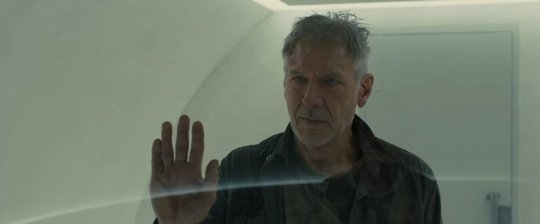
2. Deckard has depth this time
Being a daddy changes you a lot. Rick isn’t just a slouchy drunk who likes to shoot robots out of legal obligation. He’s a man who’s principles and love for forbidden things cost him his life. What kind of soul did Deckard have in the first film? Who did he care for? Please don’t say, Rachel, we all know why he was attracted to Rachel. Like Winston in 1984, Deckard rejects Big Brother for a life of pain to gain a glimmer of happiness.
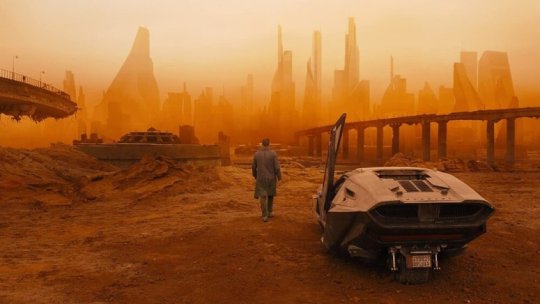
3. It’s horrifyingly relevant
Denis Villeneuve based the imagery in 2049 on a planet that has become degraded with pollution. The buildings are extrapolating enormous amounts of water into the atmosphere, the sea wall at the end of the picture will be our new Mount Rushmore, the orange Vegas is happening now. Denis Villeneuve didn’t predict the earth looking like this, but his production team was still spot on. A picture that transcends its very style, developing a look that will be discussed on its merits separate from the ubiquitous original, is a stunning achievement.
Everything isn’t dystopian because that’s the way it was in the book. It’s what will happen to us in real life, why we’d look for colonies to live on if we had the technology or funding towards NASA to do so. God help us all.
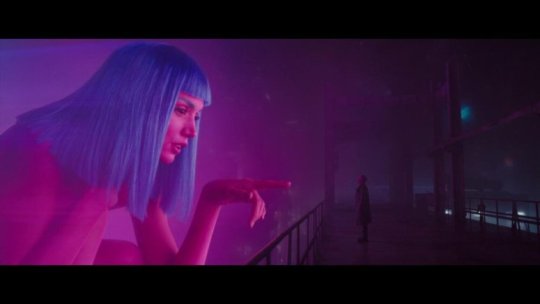
4. The love story questions the essence of relationships
The story between K and Joi further examines the meaning of love, sex, and mortality, with the two being different versions of artificiality. When the default sexed-up version of a naked Joy pops up on the screen, we are emotionally mortified. Some of us may be repulsed to observe a character we care for utilized like a thirsty Godzilla.
The towering ad tries to seduce K tempting him to buy it, rendering everything Joi said to K throughout the picture questionable. Its manipulation solidifies his final decision in life to help another man. We’re not sure if she loved him or said what it thought it wanted him to hear throughout the narrative. Possibly Joi herself didn’t know her intentions. An unusual amount of nuance and uncertainty rests in the love story. Who do we love? Why do we love? Do we love by the heart or the heart of our designers whom we don’t know?
Meanwhile, Deckard was just drunk and horny when he bashed Rachel up against the wall. Sorry, that really was all there was to their passion despite what Wallace says.
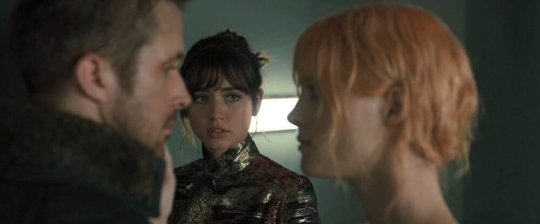
5. The movie was an honest commentary about how the world views woman
Here’s a controversial one. A lot of women were disgusted by the way they were depicted in the film. Outwardly watching the movie, I can’t blame them. I’ll let Mr. Villeneuve speak for himself. “I am very sensitive to how I portray women in movies. This is my ninth feature film and six of them have women in the lead role. The first Blade Runner was quite rough on the women, something about the film noir aesthetic. But I tried to bring depth to all the characters. For Joi, the holographic character, you see how she evolves. It’s interesting, I think. What is cinema? Cinema is a mirror on society. Blade Runner is not about tomorrow; it’s about today. And I’m sorry, but the world is not kind on women.”
Villeneuve is right. Women today are still sexualized. Even with the Me Too movement, women are continually seen as sex objects or subservient slaves in a male-dominated society. Villeneuve isn’t interested in painting a rosy picture that Hollywood does for female roles to make the audiences feel comfortable. It’s an honest reflection on who we are. What we see is what we don’t want to see, but that’s part of the honesty of cinema.
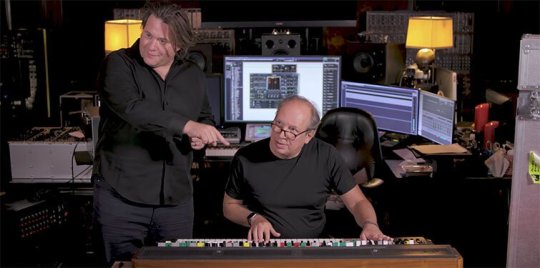
6. The score is mesmerizing
Another point in which I may face some contention. Yes, Vangelis’ score is iconic, but it only works for the era it was composed in. Much of its mixture of bleeps, blops, and wind chimes are a product of its time. A lot of emotion is missing from the score other than the opening theme and “Tears In Rain.” Hearing much of the soundtrack while on the road, I sometimes thought I was listening to something from a porno. Take a listen to “Wait For Me” in the soundtrack and tell me otherwise. Hans Zimmer and Benjamin Walfisch’s score is timeless while also paying respect to Vangelis’ synthetic use in the original. It dives into the character’s mind providing a replication of something more human than what Vangelis composed.
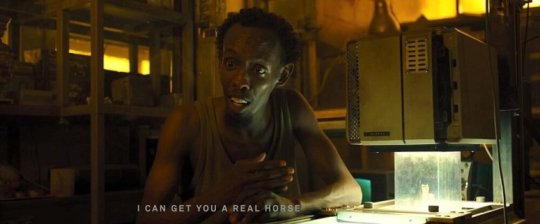
7. It thematically ties more directly to “Do Androids Dream of Electric Sheep” than “Blade Runner” does.
“Blade Runner” got the overall gist of Phillip K Dick’s novel. Replicants are scared, trying to find a way to survive as Deckard hunts them down. However, the Andies in the movie almost deserve to die. In their quest for more life, they torture and kill multiple civilians. What did the guy making the eyes do to deserve being frozen to death? What about J.R. Sebastian? He was nothing but pleasant to Roy and Pris. Did Roy eye gauge him when he was done with Tyrell?
Aside from Luv (Sylvia Hoeks), our replicants are fully rounded people. Sapper Morton is a watchful protector who was meant to be a NEXUS 8 combat medic; Joi’s true intentions come into question for herself and us. K’s inner conflict is the central core of the story. All of this revolves around the meaning of existence within a world that has forgotten about you. The introduction of Robo procreation is an evolution of Dick’s ideas, widening his notion of why life exists in the first place.

8. It doesn’t get lost in the scale
Many sequels love scope over characters. Remember “The Matrix”? Remember how they talked about Zion and all these other things we didn’t see? When the sequels brought in Zion, the focus got lost in the spectacle. “The Matrix Reloaded” was a bumbling CGI mess of Agent Smith Clones and cave orgies. “The Matrix Revolutions” was a glorified “Space Invaders” game. Shoot as many sentinels as you can before becoming overwhelmed. Amidst the sequels bumbling chaos, I missed the smaller scale of the Nebuchadnezzar crew.
The story of “2049” could have focused on the replicant uprising with thousands of robots slamming into humans. We could have gone off-world to finally see what all these other colonies we’ve heard about are like. Some have argued that the movie could have borrowed some of its source material from the later novels about replicants creating humans, so on and so forth. All of that sounds incredible in theory. In execution, you would likely get “The Matrix” sequels.
A movie that overreaches in scope, attempting to please fans by showing everything. What we got was an incredibly meaningful story that further explores the themes of the original while building upon its world without going too far. We see what’s beyond L.A. on the dilapidated west coast. The answer is not much. The film aims at minimalism over extravaganza.
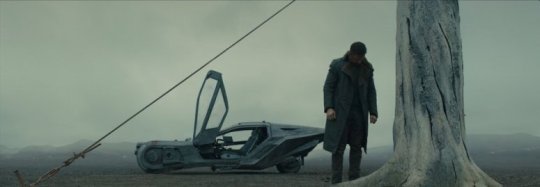
9. We’re still talking about it
After being MIA for decades, “Blade Runner 2049” isn’t forgotten. I can’t say the same for “Superman Returns,” “Monsters University,” “The Incredibles 2,” “Live Free or Die Hard,” and “Indiana Jones and The Kingdom of The Crystal Skull.” In fairness, people do talk about Indy 4, but not in a positive fashion. “Blade Runner 2049” returned to the limelight with disastrous box office results yet high accolades, even gaining the Academy’s attention. Ironically it seemed destined to live the life of its predecessor.
“2049” may have tanked because it was a multimillion-dollar art film that respected its audience’s intelligence. Maybe “Blade Runner” was too far gone amongst the public to gain an interest geared almost entirely towards comic books and Disney. I think the trailers after the reveal teaser looked too generic for my own two cents, turning me off from the film for a short while.
Here we are with Honest Trailers in 2020, making a video about a film that came out in 2017. Bloodsoaked orange skies from the headlines mention the atmosphere of this film. Somewhere, about 100 other people are writing their analysis of “Blade Runner 2049” as I type right now. Seven years from now, we’ll be talking about why the world is still like “Blade Runner 2049.” Villeneuve made a timeless sequel to be remembered.
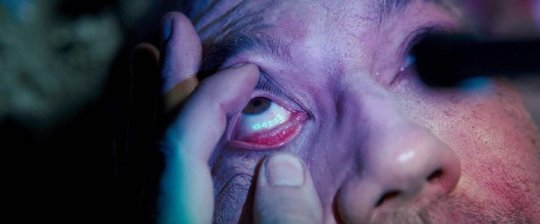
10. It’s better than the first film and one of the best films in the last ten years
Here’s why you’ll probably agree with this one when you put your pitchfork down. Remove your nostalgia goggles. I know it’s hard to do, please, trust me. Look at the points I made above. Think about how ironic the love story is to our lives. The layers of meaning behind K’s existence is lightyears beyond the featureless Rick Deckard. The picture isn’t flawless. Niander Wallace is spectacularly corny in his scenery-chewing grim monologues. Dr. Eldon Tyrell had some ambiguity regarding the morale of his intentions. For that, I’ll give the original the benefit of my doubt. I understand Ryan Gosling was cast to be intentionally deadpan, but it’s okay to emote once. His distant stare in all of his other performances made it difficult for me to discern myself from the actor’s rather dull persona.
With this said, “Blade Runner 2049” understands cinema. Its atmosphere is why we venture into a dark room that takes us to a different place. Denis Villeneuve’s masterful follow up is one of the most orgasmic cinematic experiences I have witnessed in the last ten years that demands a re-screening in 2022 when theatres reopen at an entirely safe capacity. The style doesn’t overshadow its substance, which is far richer in detail than the original without grasping at blatant metaphors. “Blade Runner 2049” is slow cinema at its finest, letting us into the character’s heads, knowing when to be quiet and when to be loud.
Like “The Empire Strikes Back,” not everyone appreciated the movie at first. Time has been incredibly kind to it, though. I wish the Academy recognized “Blade Runner 2049” beyond its technical marvels in 2018. I suppose it wasn’t the type of picture that catches Oscar voter’s eyes. But it has acquired the audience’s to this day. Now, if you could just look up and to the left for me?
from you’ll probably agree website https://ift.tt/3kxHs7O
via IFTTT
from WordPress https://ift.tt/3kG03i7
via IFTTT
5 notes
·
View notes
Text
David’s Resolution - Day 9
Day 9 (January 9, 2019)
Dark City (1998)
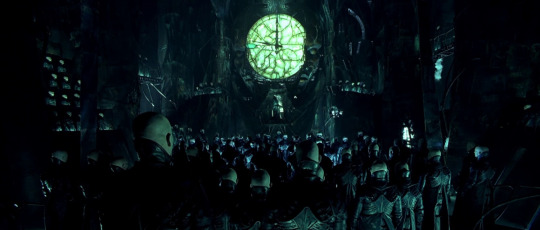
“Hey, you happen to know the way to Shell Beach?”
A man wakes up in a bathtub in a dingy apartment. He has no memory of who he is, where is he, or how he got there. Soon after he wakes up, the phone rings and he picks up, receiving a message telling him to flee before a group of people start coming after him. The man, as he leaves, learns that he is apparently “John Murdoch”, and he may or may not be a serial killer targeting prostitutes. And in his search for answers, he’ll come across a variety of interesting characters - a woman who says she’s his wife, a detective who think he’s the killer, a doctor who may or may not be trustworthy - while also questioning the reality he lives in and what the truth is.
Yep. Another movie I don’t want to go into details on regarding the plot because of spoilers. And trust me, you don’t want to spoil this movie for yourself. Go in as blind as you can. ...With that said, time to gush about this movie because this is a big favorite movie. Easily a top 10 favorite.
You know what, let’s get this out of the way. Yes, Dark City has quite a few similarities to The Matrix, even though The Matrix came out a year later. Similar themes of identity, distorting reality and such are in both films, plus lots of people in leather. although how they present themselves are very different. While the Wachowskis explored philosophical and religious themes in their cyberpunk action movie, writer/director Alex Proyas was more into telling an interesting and compelling mystery within a unique world influenced by film noir and German expressionism. Don’t get me wrong, both films are great, but if you feel The Matrix is too pretentious for you, then you may like Dark City more.
You know what both films do have that can’t be disputed? Rad-as-fuck visual design. The titular city is very dark and almost a character in itself, creating a sense of isolation, paranoia and confusion that good expressionism always invokes. It feels familiar and at the same time alien, even more when you The design feels reminiscent of Batman: The Animated Series in that it goes for a “timeless” setting that mixes modern and old settings and ideas. Actually, in a way, it does kind of feel like a comic book, as the city owes not only to classic film like Fritz Lang’s M, but also to the depiction of Gotham City in Tim Burton’s Batman, and the way the story unfolds and how scenes are framed and shot looks like comic book panels come to life. The world of this movie and the ideas present in it are absolutely fascinating, such as the concept of how memories work in this city and how tuning works and the nature of the overseers of this world.
The cast of the movie is great. On the human side, Rufus Sewell is excellent as John Murdoch, the man desperate to understand who he really is and what the hell is going on. Kiefer Sutherland’s Dr. Schreber is a hobbling, Peter Lorre-esque character whose motives are cloudy and whose allegiance is questionable... is he on the level, or is there something more sinister about him? You’ll have to watch to find out. Jennifer Connelly’s performance as John’s wife and a singer is intriguing, though it’s irritating that the theatrical cut overdubbed her singing voice. (The director’s cut rectifies this by giving us her original voice, which is pretty good.) And William Hurt’s Frank Bumstead, the police inspector investigating the murders and by extension John, comes off like a world-weary veteran similar to Morgan Freeman in Seven, who himself slowly realizes that the ramblings that both John and a former detective are saying may have some merit...
Then you get to the “Strangers”, the mysterious trenchcoated people in white who seemingly run the city, literally reshaping it however they seem fit. They act like a race based around Riff Raff from The Rocky Horror Picture Show, which is fitting since not only did Alex Proyas base the Strangers on Riff Raff, but Riff Raff himself - Richard O’Brien - plays the lead Stranger character, Mr. Hand, a sinister figure tasked with hunting down John however he can. Also, all of the Strangers going by “Mr. (whatever)”, combined with the way they speak, reminded me of the henchmen from Diamonds Are Forever (or, alternately, think those two lifeguards from Codename: Kids Next Door.)
Also, Bruce Spence is in it, who to me is in the category of “hey, it’s that guy!” actors. He’s been in plenty of films: he’s the Gyro Captain in Mad Max 2 (a.k.a. The Road Warrior to us Americans), a similar character in Mad Max Beyond Thunderdome, the Trainman in The Matrix Revolutions, one of the sharks in Finding Nemo, an alien in Star Wars Episode III: Revenge of the Sith who helped Obi-Wan on Utapau, and the Mouth of Sauron in the extended edition of The Lord of the Rings: The Return of the King. He’s a cool guy and I like seeing him in things, and I just wanted to point it out. He’s Mr. Wall in this film, by the way, the tall Stranger who ended up- wait, what was I on about again?
Oh yeah, Strangers. The Strangers are sinister motherfuckers who run the city, using a psychic power called “tuning” to play The Sims: The Real Game, literally reshaping the city and giving people different identities and memories as they see fit. Why? They have their reasons. And their leader, known as Mr. Book (Ian Richardson), organizes a mass tuning every 12 hours where they put all the humans to sleep so they can screw with the city however they will before waking everyone up. The full extent of how this goes is disturbing and creepy, and you will see for yourself how creepy it is. But in a way, it reminds me of one of my favorite anime, The Big O, in that both stories took place in cities seemingly isolated from the world, use heavy noir elements, feature a mixture of old and new in their designs, and which explore memories and loss of memory as central themes.
Actually, a thought I had on the movie was that one could read it as some metaphor or symbolism or whatever about making movies and having people play different roles in stories and etc., but #1, that could be me reading too deep into something and #2, I can’t go into further detail without spoilers.
I’ll mention that this movie had an interesting release. It barely broke even in the box office, and some critics liked it while others had more lukewarm reactions. But there was one person in particular who absolutely loved the movie, and it was none other than Roger Ebert. “Love” is a strong word, and it applies to his glowing review of the film, but it goes further than that: he called it the best film of 1998, he put it on his list of “Great Movies” in 2005, he would use the film in his teaching about movies, and he contributed audio commentary for both versions of the film on its DVD release. This doesn’t really have anything to do with the review, but I find it interesting to mention. And it’s why I mentioned Roger Ebert in the “Next time” message for this review that makes sense only to the guy who writes this. (Boy, two bits of rambling...)
This movie does have a director’s cut, and while the theatrical cut is still a great film, the director’s cut is even better. What’s most interesting is that it not only changes scenes from the theatrical cut and adds some more scenes to make the film feel even more fleshed out, it also makes minor changes that apply to the entire film. The theatrical cut has largely blue and grey coloring that gives the film a colder and more detached feeling, while the director’s cut uses more yellows and greens, which I feel gives it a more disorienting and sickening feeling, like there’s something just underneath that doesn’t sit well and could represent how John sees the world. The effects used for John’s tuning are also tweaked: the theatrical cut’s effects looked a lot like when Mr. Freeze fired his freeze gun in Batman & Robin, while the director’s cut uses more subtle effects. Point goes to the director’s cut there. But really, you should watch both versions. I watched the theatrical cut first, even with that opening monologue (which I feel isn’t really a big spoiler since you learn what it mentions pretty early in the movie, plus, does it really spoil anything that major?) and it’s still good.
You know how people say they instantly love a movie the first time they see it? That’s this movie for me. I highly recommend it. If you like The Big O, film noir, expressionism, mystery thrillers, or just want something like The Matrix without perceived intellectual posturing, then here you go. Everyone go see this movie, it’s great.
Next time: Four people, one camera, and a lot of neuroses.
2 notes
·
View notes
Text
Used To It (one-shot)
Oops I accidentally did a smut fill. And a Ratchet/Rodimus. I’m not 100% sure how this happened but here we are.
Inspired by this prompt on @maccadams-filthy-fills. Dunno if this is what the prompter was expecting but hopefully they like it.
Series: TFIDW/MTMTE
Ship: Ratchet/Rodimus, mentioned past Ratchet/Optimus and Ratchet/others
Rating/warnings: M/E for sticky interfacing and, well, what the prompt discusses. Divinely inspired sex drives and attraction, with some characters being chill with it (the ones featured in the fic)and others not so much (only mentioned in conversation)
Inspired by the prompt:
There’s an aura about a truly Matrix chosen Prime that leaves the mechs around them slightly infatuated and more than a little revved up. Back in the day there was an entire class of priests dedicated to assisting those who had to spend a lot of time with the Prime. But many things were lost to history and war, and no one is prepared for Optimus and/or Rodimus
Summary:
Ratchet knew that siren’s call all too well.
“Slaggin’ Primes.”
~~~~~~~~~~~~~~~~~~~~
Truthfully, Ratchet was a bit embarrassed that he hadn’t foreseen it coming.
And that he hadn’t even noticed it when it was right under his nose.
No doubt Ratchet would have gone right on missing it completely if he hadn’t finally had the time and energy to self-service, stroking himself as he sprawled across his berth, and a stray thought crossed his mind.
Rodimus would feel incredible around his spike.
His servo stilled and he could feel the way his face twisted. Rodimus was far from the worst mech to fantasize about, but Ratchet couldn’t pinpoint just why Rodimus would pop up in the first place. All attraction to the boisterous speedster had been swiftly categorized as junk information from the beginning since Ratchet simply didn’t have time for that sort of mess. Ratchet had hardly been the best at avoiding mixing work with play during the war, and he was trying to remedy that to some extent. Things were crazy enough in this post-war world without that sort of madness, so it was better to just ignore it, even within the privacy of his own processor.
Rodimus being attractive was an ignored fact. He shouldn’t have crossed Ratchet’s mind in the first place.
But processors were finicky business where matters of the spark and, more importantly, matters of the interface array were concerned.
Best to just shrug it off.
So Ratchet abandoned his spike to slip down into his valve. New sensations would lead to new thought threads and—
Frag, but Rodimus would feel so good inside him.
Ratchet groaned a decidedly irritated groan as his helm thunked back against the berth.
But his servo didn’t stop moving. His spike throbbed where it had been abandoned as his valve calipers clenched around his digits at the thought of Rodimus – bright and glittering plating sleek under another’s touch, under Ratchet’s touch, as his gorgeous frame arched up towards him, pulling Ratchet in. Into the undeniable charm and magnetism that was Rodimus, that all-consuming aura, bordering on something sacred and holy—
Ratchet’s optics snapped online, shock and bewilderment warring in his processor, but his spark whirled nearly giddily as his frame teetered on the edge of overload.
But he kept his servo still this time and waited until the wave of desire had passed.
Ratchet knew that siren’s call all too well.
“Slaggin’ Primes.”
“Wait. Is that why everyone on this ship is charged up 24/7?”
“I’m sure the close quarters and easy access to engex doesn’t help, but yes,” Ratchet replied, his servos folded together on his lap. “The continued proximity to your spark is a large factor.”
Rodimus stared at him blankly.
“But I’m not carrying the Matrix anymore, in case you somehow managed to forget.”
“It’s not the Matrix itself,” Ratchet explained. Rodimus’s plush lips pursed with confusion and Ratchet retrained his optics to the captain’s to avoid any tempting thoughts about those lips. “It’s a result of the changes your frame and spark underwent when you were chosen by it. I’m sure you’re already aware how monumental those changes were.”
Rodimus’s face lit up at that.
“It was a pretty wild ride.”
Ratchet couldn’t help rolling his optics before continuing, “Whether it’s purposeful or not is debatable, but the fact stands that those changes give your spark an aphrodisiac-like quality.”
“Which is doctor talk for turning folks on.”
With a shrug, Ratchet leaned back in his chair. “Yep. It’s slight enough to not be particularly noticeable, but the effect builds up with repeat exposures over time. So when you have a crew that is exposed to you regularly–”
“A little turned on becomes full-blown horny.”
Ratchet nodded.
Rodimus leaned back in his office chair and lifted his pedes to settle on his desk. Ratchet had expected the captain to gloat, or at least be smug about his effect on others, but instead his lips were pressed tightly together.
“So how do I stop it?”
“You can’t,” Ratchet said plainly. “It’s a part of being a Prime, and that simply isn’t something you can turn off as you wish.”
Rodimus didn’t look happy with the answer. His mouth was a hard line.
“Ohhhhkay. Then how do mechs, you know,” Rodimus asked, waving his servo vaguely, “deal with it.”
“Assuming you aren’t looking to hire some comfort mechs painted up to look like Priests?” When Rodimus just looked slightly alarmed, Ratchet waved it off, explaining, “It’s a joke, kid. That’s how Primes used to deal with their advisors looking to jump their bolts. I guess most folks wouldn’t know that outside of Iacon.”
“Yeah, can’t say I knew about any holy shareware,” Rodimus admitted. He didn’t look much comforted by the realization either. “And I think I’ll pass on that, thanks. Seems a bit much.”
Ratchet nodded his agreement. “It hasn’t been a feasible option for a long time, and I wouldn’t suggest bringing it back.”
“Soooo…?”
“You want my honest answer?” When Rodimus nodded, Ratchet further warned, “You’re not going to like it.”
“I can’t say I really like anything about this situation so that’s nothing new,” Rodimus grumbled.
Ratchet couldn’t help lifting a brow.
“I would have thought you’d get a kick out of this.”
“Magnus can barely stand to be in the same room as me anymore because he’s so upset about the fact that he wants to clang me,” Rodimus stated, tone casual but the tightness of his face giving away how it was hardly only Ultra Magnus who was upset about the circumstance. “He apologized for it, Ratchet. Do you know how much it sucks to have someone apologize for that? And then when I want to hang out with Drift to talk about it, he’s ‘busy’! He’s busy all the time when he’s not staring at me! The only time anyone will be around is when they’re flirting and—and I’m tired of it! So whatever you can do to make it stop, it’s fine. I’m game. Whatever I can do to help.”
Ratchet frowned.
“There’s nothing that you can do about it, Rodimus.”
Rodimus stilled.
“Come on, Ratch. That can’t be true.” The desperation was palpable in his voice.
“But it is,” Ratchet admitted. He shifted to the front of his seat, elbows on his knees as he considered Rodimus seriously. Millions of years of practice shoved lustful thoughts from his processor. “This isn’t something that you can fix. It’s going to be a bumpy ride, and it’s going to be awkward, but everyone on this ship will figure out how to deal with their desires on their own and things will eventually settle down.”
All at once, Rodimus deflated, looking hopeless.
“But what if they don’t?”
“Trust me, they will.” Ratchet suspected that Drift was already in the midst of navigating the attraction to his friend and would come out the other side all on his own soon enough, but Ultra Magnus seemed the type who would need reassurance. After making a note to see the Second about it, Ratchet made another to contact Rung. Together they could probably work their way through the crew—
“How can you be so sure?”
“Do I really need to remind you the company I kept for the last four million years?”
Rodimus blinked. And then blinked again.
And then his optics went wide and bright as he lifted his pedes off his desk to sit up straight in his chair.
“Optimus?” he managed, at once shocked and awed, and Ratchet couldn’t help an amused huff of his vents.
“Oh yeah. It was mostly us lieutenants and advisors since we had the most continued time with him, but any ship he stayed on long enough would become a crew-wide game of musical berths.”
Rodimus’s mouth hung open and Ratchet would swear he could hear the captain’s processor churning from where he sat.
“You wanted to clang Optimus.”
“As much as anyone else,” Ratchet admitted with a shrug. “But my point, Rodimus, is–”
“Did you?” Rodimus asked, leaning forward in his seat as the shock gave way to a perverse curiosity.
With an exasperated ex-vent, Ratchet continued, “My point is that there are other ways for the crew to release their pent up–”
“You did. You totally clanged Optimus.” Rodimus seemed nearly giddy with his discovery, at once fascinated and entertained.
It was better than the sullenness of before, and it would be a lie if Ratchet said his spark didn’t leap at how beautiful Rodimus looked when grinning, even if it was at his expense. The Prime was so easy to please–
Ratchet sighed at the predictable way his frame reacted to the thought.
“We didn’t make a habit of it, if that’s what you’re suggesting.” Ratchet crossed his arms over his chest, as if that could contain the dancing of his spark.
But?” Rodimus wheedled, out of his seat now with his palms on his desk as he leaned over it, leering at Ratchet. While the circumstances were completely different – Optimus was never, at even his most light-hearted moments, so ridiculous and flashy and silly – the longing of his spark and the ache of his interface array was the same.
It had felt incredible to let himself give in to Optimus’s draw, and there was no doubt in his spark that Rodimus could easily meet those staggering heights.
Primus, how he longed.
“The allure of a Prime is hard to ignore,” Ratchet managed in lieu of the statement of fact that Rodimus was looking for.
Nevertheless, it gave the captain pause.
“Oh,” Rodimus said, almost more ex-vent than word, his optics tracking down Ratchet’s frame, as if really noticing him for the first time. Rodimus’s vents shifted minutely, opening that slightest bit wider. “You wanna frag me too.”
Ratchet couldn’t help a small, amused smile.
“I’m hardly immune, kid. Fortunately for you, I have a lot of practice keeping it behind my panels.”
Rodimus’s gaze finally lifted to meet Ratchet’s and a slow, heated grin pulled at those lush lips.
“You don’t have to,” Rodimus said casually, leaning that slightest bit closer and letting his spoilers flick out enticingly. “You could make it two for two.”
Arms stayed crossed over his chest, but Ratchet’s servos tightened where they clasped his own armor to keep them to himself.
“I thought you didn’t like this whole mess.”
The grin fell for a moment as Rodimus ex-vented, explaining, “I don’t like everyone acting weird and apologetic about wanting me. It’s making them uncomfortable to even be around me and straining our relationships. But you—” Rodimus shrugged as he actually let his elbows rest on the desk so he was bent over the surface, watching Ratchet’s face. “You don’t seem to really care about the fact that you’re horny and want to interface with me.”
“Course not. I’ve been in too many berths and around too many Primes now to bother with shame at this point,” Ratchet replied. “Doesn’t get anyone anywhere.”
“I’m so going to pick your processor about those berths,” Rodimus said. “But later. Because if you’re honestly ok with all of this, I’m totally serious about wanting to frag. All of this attention has got me revved up with nowhere to burn it.”
Ratchet rolled his optics, but that didn’t keep him from finally uncrossing his arms to instead lean them against his knees, allowing him to shift closer without leaving his seat. No need to give away the sheer want now thrumming through his lines. “Why wouldn’t I be ok with it?”
“‘Cause the Matrix made you do it?” Rodimus offered, shrugging, casual as could be except for the intensity of his focus, looking for any sign of—discomfort perhaps? Uncertainty?
With a slow ex-vent, Ratchet pushed up to his pedes. Rodimus straightened, watching him but not pulling away when Ratchet’s servos braced against the desk on his side of it, bringing their faces closer together.
“Listen, let me make something clear,” Ratchet started. “Your aura draws mechs to you, and as a result, yes. It makes us revved up and marks you as the target for release. But that’s it. It’s just an attraction and raised interface drive.” When Ratchet leaned in closer and finally allowed his armor to relax, Rodimus’s optics flared with interest and his spoilers gave another flutter. “We can get ourselves off. We can get off with each other. Hell, we can just ignore it. Nobody has ever died from ignoring their interface drive that I know of.”
The proximity of the Prime’s spark made Ratchet’s thunder in his chest, as if it could escape and join with Primus’s emissary.
“So you’re saying you could leave if you wanted to,” Rodimus clarified, and when Ratchet nodded, the wide, bright grin was back. “But you don’t want to leave.”
Ratchet’s vents opened as his fans started to whirr to life.
“Lucky for you, you were already my type, hotshot.”
“Rod, actually,” Rodimus teased even as he leaned further across the desk, close enough now that their ex-vents mingled. “But you’re old enough that I don’t expect you to remember.”
“Like you’re as young as you act.”
“Rude.” There was nothing about the way that Rodimus was looking at him that suggested he was anywhere close to actually offended. Not with the way he let his lips part, his glossa peeking out the wet them. Still though, a flicker of disbelief flashed across his face. “I would have thought you preferred mechs like Optimus. Someone more your speed.”
“And what do you know about my speed?” Ratchet asked, aware that his voice was taking on a gravelly edge as his systems heated and his array pinged him to open.
Rodimus snorted, concern evaporating as he grinned smugly.
“I know you couldn’t keep up with me.”
Ratchet’s engine revved and his panels felt constricting.
“Try me.”
“Then get over on this side of the desk, old man.”
For all that his spark screamed to scramble over the surface, Ratchet had enough dignity to pull away and walk around the desk. Once within reach of Rodimus’s servos though, dignity was a lost cause as digits slipped under armor plates and glossae slipped past lips and self-control slipped from Ratchet’s grasp as he groaned into their kiss.
He should have known better than to think he could refuse a divine mess like this.
Rodimus’s plating was smoother under Ratchet’s digits than he had imagined, silky even as he pulled Rodimus flush against his frame, reveling in the Prime’s aura and his enthusiastic kisses. Rodimus kissed like he did everything else – with nothing held back as his servos demandingly cradled Ratchet’s jawline to tilt and pull him as the captain saw fit to keep their mouths slanted together passionately. When he finally pulled away it was with a grin pulling at those kiss-bruised lips.
“How have we not done this before?” Rodimus asked as he tipped Ratchet’s helm up, making room to nuzzle in and start pressing open-mouthed kisses to his neck cabling. With a pleased hum of his engine and vocalizer alike, Ratchet let his helm fall back even further and curled a servo around the back of Rodimus’s, holding him in place. “Is it ‘cause my sexy Prime powers hadn’t started working on you yet?”
Rodimus’s snickering drowned out the dull ring of Ratchet smacking the back of his helm.
“Don’t make me regret this indiscretion.”
“Yes, sir, sorry, sir,” Rodimus teased with a nip to Ratchet’s chin. “You this mean to all your frag buddies?”
“Is that what we are now?” Ratchet shot back as he leaned against the desk, his aft meeting it as his free servo pulled at Rodimus’s hip. Rodimus easily moved in close to grind their pelvis’s together, and the proximity of their chests, of their sparks, made Ratchet nearly dizzy with the rush of need.
Rodimus’s optics flared as they drunk in the medic’s expression.
“Call me self-important all you want, but you look like you’ll definitely be back, so why not?”
Rodimus wasn’t wrong, so Ratchet let it slide. After all, there were far more important things at hand. His arching array for one which was at that moment responding to the strong pulse of Rodimus’s spark over the commands of his own processor. His panels transformed away before Ratchet could stop them, leaving his valve to drip onto Rodimus’s thigh and his spike to pressurize against his abdomen.
And Rodimus didn’t so much as pause before pressing in closer, rubbing his frame against Ratchet’s array, obviously reveling in Ratchet’s lust.
And Ratchet’s spark thrilled at seeing the Prime so pleased.
“You want to clang real bad, huh?” Rodimus taunted against Ratchet’s neck as his hips rolled and the pleasure had Ratchet revving as his cooling fans kicked up a notch.
“Whose fault is that again?” Ratchet groused before tugging Rodimus away long enough to seal their lips together again and lick his way into the Prime’s mouth. With a full-frame shudder, Rodimus moaned and a quiet click announced to reveal of his own array, spike quickly pressurizing to slide along Ratchet’s.
Rodimus’s lips moved against Ratchet’s as he replied, a bit breathlessly, “Oh, that’s one hundred percent on me and my sexy Prime powers.”
“Rodimus.”
Rodimus ex-vented a laugh. “Yeah, yeah, alright. How do you want to do this?”
A thousand different scenarios came to his processor, each more tempting than the last, but above it all was just overwhelming want want want–
“Whatever you want. I’m pretty easy,” Ratchet managed.
“Yeah you are,” Rodimus said, smirking as he pulled back before Ratchet could nip his bottom lip.
“That’s not what I meant and you know it.”
“And you knew who you were agreeing to interface with,” Rodimus countered as, despite his taunting, his servo quickly slipped down to find Ratchet’s valve. Ratchet’s hips jerked forward into his grasp, ex-venting hotly when Rodimus pressed his palm against his node and his digits massaged the lips around his rim. “How ‘bout I spike you, and if we’re still up for it after, you can return the favor?”
A single digit pressed effortlessly into Ratchet, his valve wet and pliant and so very open to the Prime in front of him, but it still dragged a groan from his vocalizer.
“Sounds like a fragging plan, kid.”
Ratchet reached behind himself to brace on the desk and push up to sit on it, his thighs spreading to let Rodimus slide right into the space, his spike brushing the swell of his valve lips. The Prime’s spike was ornately painted, which wasn’t a surprise, but Ratchet didn’t have the time or processor energy to think much on it when Rodimus’s digits drifted to his valve again.
“For someone intent on reminding me how old I am, you sure do love calling me ‘kid’,” Rodimus pointed out as his optics stayed glued to his valve, seemingly appreciating the sight as he parted the lips to trace the biolights blinking fitfully in the mesh.
“If you act like a kid, I’m gonna call you kid,” Ratchet managed around the growing tightness of his intake, his spark feeling as if it was swelling enough to choke him. The fact that the Prime found him worth appreciating was intoxicating, which Ratchet knew deep down was ridiculous – he didn’t need Rodimus to like how his valve looked – but Rodimus’s damned aura and the resulting desire to please was too strong to ignore with how close they were.
And, frankly, it felt so good.
Slagging Primes.
Two digits pressed inside this time, still easy with how slick and ready Ratchet’s frame was. His calipers clenched desperately and pleasure raced up and down his lines like wildfire.
“Then you won’t get mad when I call you an easy old mech?” Rodimus asked as he finally flicked his optics up, bright with arousal as his digits curled and spread.
Ratchet didn’t need to look down to know Rodimus’s digits were already dripping with his lubricants.
“Ask me again when I can hold a conversation,” Ratchet groused. His hips rolled forward with Rodimus’s movements and his engine growled when the Prime found the most sensitive bundle in Ratchet’s lining. “Primus, get on it with already.”
“We’ve barely even started the foreplay.” Rodimus’s digits were relentless against the newfound weak spot, curled just right to stroke it over and over, drawing a shudder and a tank-deep groan from Ratchet as his thighs tightened around Rodimus’s hips.
“There’s time for that later. Right now I need your fragging spike inside me.”
Rodimus laughed, but that didn’t stop him from finally showing Ratchet’s sensitive nodes mercy and moving to replace his digits with the blunt head of his spike.
“Well, what kind of Prime would I be to deny you my ‘divine grace’?”
“Rodimus–”
Ratchet’s reprimand was cut off as Rodimus sunk into his valve in one smooth push, filling him and inadvertently bringing that glorious spark closer, and that combined with the way the Prime shuddered and ex-vented, “Scrap, you feel good”–
Ratchet moaned long and low as his legs folded around Rodimus’s hips to hold him closer, pull him further in, urging him harder and faster and deeper. Rodimus was gorgeous, vents wide open and his mouth agape, taking the hint and setting a steady rhythm. He moaned against Ratchet’s lips as his servos pulled at Ratchet’s frame in turn, caressing and holding Ratchet in place for his thrusts. Each slide had charge crackling between their plates as Ratchet’s valve accepted and tightened around Rodimus’s spike, milking him, making each stroke that much more pleasurable for the Prime and him both.
And then Ratchet let himself revel in the overwhelming rush of his spark, the perfect joy in having it’s longing fulfilled by intertwining his frame with divinity.
Rodimus’s frame heaved to cool itself as he stared up at the ceiling. His plating was covered with paint transfers and lubricant and transfluid alike, though the majority of it was splashed across his hips and between his thighs. Truthfully, the Prime looked completely wrecked.
Primus, it wasn’t fair for one mech to be so damned pretty.
Ratchet doubted his frame had fared much better. But his spark hummed with satisfaction strong enough that the medic didn’t bother to check just yet. Not when the afterglow was so lovely.
“So. Uh. You normally have that kind of stamina, or did I really manage to rev you up that hard?” Rodimus asked. “Because listen, I know I have stamina, but I think we just had at least a dozen overloads altogether.”
Ratchet chuckled as he let his arms stretch out over his helm and silently thanked whoever was on cleaning duty that week that the floor was so clean under him.
Or, well, was at some point. There were definitely puddles of lubricant and the like next to him where those last couple of overloads had finally brought the fragfest to its conclusion.
“Honestly couldn’t tell you. I’ve had this heightened interface drive for four million years and counting, so who knows.”
“Primus.”
Ratchet shrugged. “You get used to it.”
Rodimus was quiet for a moment. Then, without warning, he rolled so that he was draped across Ratchet’s chest, helm perched on his servos, and grinned down at him.
“Oh, I definitely think I could get use to this.”
Ratchet huffed as he swiped a stray droplet of transfluid from Rodimus’s cheek.
Yeah.
This was a madness he could get used to.
#fanfiction#valveplug#next fic up will be a commish for a special someone *wink*#just had to get this out of my system#who knew i shipped this#not me until now
429 notes
·
View notes
Text
Wednesday, 28th of september 2005
It’s been meetings, meetings, meetings since I arrived this morning. At times like this it is unforgivable to waste time in idleness.
I don't have time for lunch, so I bought a take-out meal on the fifth floor. I eat while checking email. I am now following up the work I received during the meetings. It doesn't look like I will make it to the bookstore today.
In the afternoon I have an interview with Frank Miller, although I can't disclose where. It’s a secret. I can that it is somewhere in Tokyo, however. Miller is visiting Japan in honor of the release of his new movie Sin City.
Frank Miller is the man who created a revolution in the world of American comics. In Japan, the graphic novel (comic books with mature stories) appeared in the 1970's and became quite revolutionary. Miller served as an important figure in bringing comics to a greater level of respect in the United States. The changes brought about by his work are akin to those that occurred within Japanese comic culture.
Miller’s works differ greatly from any comic publishing in America. He does everything by himself: story, dialogue, art, even the covers. When he began working, American comics were created by several staff members who each worked on different aspects of the comic. Miller's method of working was unconventional. Furthermore, his comics are presented in black-and-white, a colorless aesthetic which is considered indispensable by American comic standards.
Miller's appearance on the American comic scene turned the industry's sensibility on its head. His style encompasses more than the traditions of American comics. His work bears similarities with the French bandes design, so his comics were introduced and advertised as entertainment for mature audiences.
Miller is more than just an artist. He is an innovator and pioneer. I like people who break new ground, I have respect for them.
I was able to hear from Mr. Miller about the struggles he experienced in the American comics industry. I was also able to hear about the strong attachments he feels toward his own works, almost as though they were his children.
The interview was short, only one and a half hours, but I really enjoyed myself.
I told him I am a big fan of Jessica Alba, who plays Nancy. With a joking smile he responded: "All men are big fans of Jessica Alba.” He is a marvelous gentleman with great, intelligent sensibilities.
The interview with Miller will appear in Famitsu magazine on October 21st.
Before we parted I asked if he would autograph my copy of Hard Boiled, one of his comics that was first published in Japan ten years ago. As a side note, I almost met Geoff Darrow (who illustrated Hard Boiled) five years ago when he came to Japan for the publicity campaign of The Matrix.
I don't know why, but both Miller and Darrow addressed me as "sensei" when we first met. I wonder why. Perhaps this, too, is an influence from graphic novels.
Robert Rodriguez directed the movie Sin City. He fell in love with Miller's work. I first saw the film in a theater in Santa Monica. The other day I saw it for my second time at a pre-release viewing room of GAGA Communications, Inc.
The film industry hasn't seen anything like Sin City before, it is a completely new type of movie. I almost want to say that it’s not a movie at all- it’s Sin City and nothing else! This movie will change how filmmakers translate comics into movies, just like how Miller transformed the comics industry. When we use the magic of digital technology we give a dynamic sense of movement; a liveliness; to a comic. We can create a world that hitherto was impossible.
Showing the possibilities of digital technologies requires great ambition.
It’s Wednesday. At Kojima Productions it is the day of the week when we all go out to see a movie, something we called “The Longest Day.” As long as we don't have any urgent work, we leave work at 5:00 PM. On the second and fourth Wednesdays of each month, we try to enlighten ourselves by attending a movie, a concert, an art gallery, or visit the gym. We follow the example of Kounosuke Matsushita who established a five-day workweek for his company, Matsushita Electronics, in order to improve productivity.
All the movie theaters set aside Wednesdays as “Ladies Day” that gives discounted ticket prices for women. It is a double-deal for the female staff members. “The Longest Day” has been in motion for about three months now at Kojima Productions. The staff seems to have accepted it as firmly established. They take their work very seriously, so they really seem to appreciate the chance to watch movies.
However, today no one relaxes. Everyone is busy working in the office today playing Subsistence, checking MGO, and testing MGA2.
I would like to see the film Bewitched but at Roppongi Hills the movie is scheduled to run only during the daytime. I still haven't been able to see it. The film will run in the theaters until September 30th. I won't have time to see it before then I suppose. But I want to see Nicole!
I'm so busy with MGS3, so no movie tonight. Goodbye, Nicole.
Once more I am checking the MSX version of Metal Gear that will be included in Subsistence. Every time I want to open a door I have to select the exact keycard that will open that door. For instance, when the player must run through all of the keycards in the gas room, he must enter the equipment submenu and change the equipped item from the gas mask to one of the keycards. While I'm testing the keycard on the door, Snake's life diminishes because of the poison gas. I got crushed by a tank while trying all the different cards for the door.
Yup, just got crushed again.
When the MSX version was ported to cell phones in Japan I was asked, "Should we update this part of the gameplay to the current standard wherein the player just holds the card and the door opens if it's at any level of access below the player's maximum level of security clearance?" The original idea was to experience the thrill of choosing the exact right card to escape while enemies close in on Snake. I insisted we keep the original idea.
While working through the MSX Metal Gear for Subsistence, however, I thought, "Maybe this is too difficult?" After a long time away from the game, it is difficult to adjust to the difficulties of retro gameplay.
I have to consider whether or not I really want to transfer the exact same character to this new incarnation. I think that it is OK to update old things to current standards, but I cannot alter the game's essence. Games should evolve with the times.
Around midnight I check the sound on third chapter of the third Subsistence disc. It is a quick chapter with a lot of action and features boss fights with Ocelot and The Pain. The chapter doesn't have much character to it. It sounds cool to say that it's a chapter with non-stop action that doesn't let the audience catch their breath, but in fact, it's just a chapter in which two abnormal opponents appear and show off.
That's just part of the character of the MGS universe.
When I watch it, not as a game, but as a linear stream of events, I notice that it seems similar to an American comic. Listening to the game with Dolby 5.1 Surround Sound I feel as though I were amid a swarm of bees.
"PAIN!"
0 notes
Text
10 Things In Sci-Fi Movies You Didn't Know Were CGI | ScreenRant
From early pioneers like Tron and Terminator 2: Judgment Day, to game changers like Episode 1: The Phantom Menace and The Matrix trilogy, CGI has been used to augment the ideas and themes presented in science-fiction films. Science fiction as a genre provides different perspectives on how we think of everything from the future of our race, to the perils of technological advancement and the complexities of space travel. Computer graphic imagery and the advancements in that field help filmmakers realize their visions in ways that weren't possible with practical effects alone.
These days, CGI is more prevalent in science-fiction films than ever before. We're used to seeing the big spectacle of space battles in the latest Star Wars film. We've become accustomed to the exotic aliens of Star Trek films. But what about when CGI is used so subtly you don't even notice it? Or for things other than giant spaceships and strange extraterrestrials? Below you'll find ten things in sci-fi movies you didn't know were CGI.
10 Star Wars: The Force Awakens
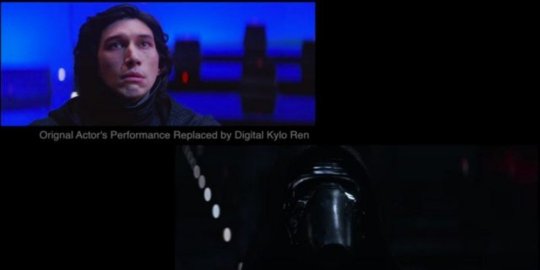
Sometimes the CGI in sci-fi films is used not for huge battles or giant creatures, but to fix mistakes or recreate common objects. CGI has become a staple in the latest Star Wars films, especially for obvious things like ships, planets, space. But it was also used rather subtly and to great effect in The Force Awakens.
RELATED: Star Wars: Kylo Ren's 10 Best Moments (So Far)
The dialogue between Supreme Leader Snoke and Kylo Ren about Ren really being Ben Solo, Han Solo's only son, was meant to be later on in the film. Therefore, it was filmed with Ren's helmet off. JJ Abrams decided the reveal should come sooner, and the scene had to be reshot, with a CGI mask placed over Adam Driver's face. You can't tell it isn't a real helmet.
9 Deus Ex Machina
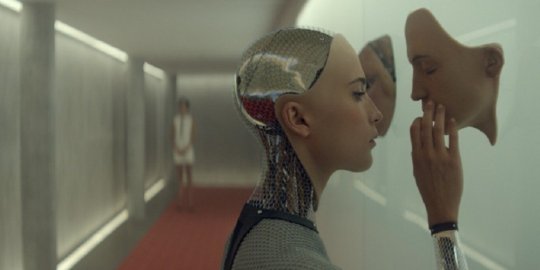
Deus Ex Machina is a genre film that relies more heavily on ideas than visual effects, as implied by the nature of its title, which implies a plot contrivance. Alicia Vikander stars as the cybernetic artificial intelligence unit that is created by the minds of a brilliant programmer and a Dr. Frankenstein-like engineer.
While in many scenes it appears Vikander is wearing some sort of suit that might simulate her cybernetic bodyform, she isn't. Only her face, hands, and feet are her own; everything else is CGI. It moves with such synchronicity to her own body movements as to appear virtually indistinguishable.
8 E.T.
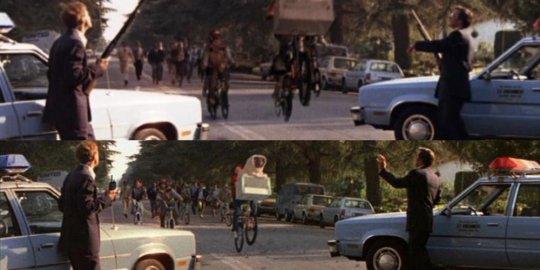
One of Spielberg's landmark films, E.T. didn't make a flashy use of CGI in 1982, with the renowned filmmaker electing to use puppetry and practical effects wherever possible (save of course for the iconic bicycles-to-the-moon-shot). All bets were off when it came to the 2002 DVD release, however.
RELATED: Steven Spielberg's 10 Best Movies, According To Rotten Tomatoes
Spielberg had often said that if he could go back and "fix" anything in the film, it would be the guns used by the police who go after the escaping kids. He felt it was distasteful for officers of the law to draw weapons on children, and used CGI to swap the guns for walkie-talkies.
7 Jurassic Park
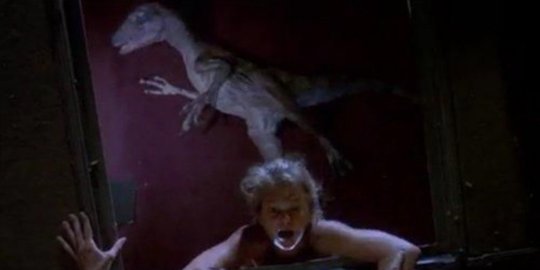
Jurassic Park is known for pioneering some incredible CGI effects, many of them the result of blending techniques used in stop-motion film making with modern innovations in computer graphic design. But the dinosaurs weren't the only things being rendered that way.
In the scene where Dr. Grant, Dr. Sattler, and John Hammond's grandchildren are forced to escape into the air ducts of the Visitor's Center, Lex nearly plunges to her doom. The moment where she nearly falls from the edge of the duct to the hungry velociraptor below featured a stunt girl that inadvertently looked into the camera. CGI had to be used to put the actress's face over hers rather than reshoot the scene.
6 War For The Planet Of The Apes
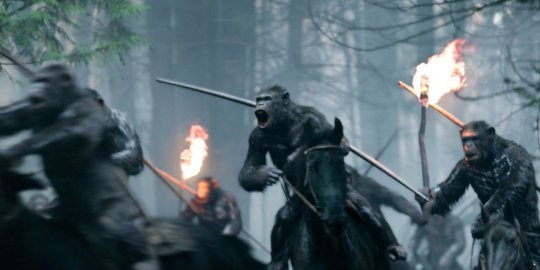
While audiences know that the talking bipedal apes featured in the new Planet of the Apes trilogy aren't real (and also not all played by Andy Serkis), they may not know how CGI is utilized in the rest of the films. Some of the most impressive uses of it are featured in the third film, War for the Planet of the Apes.
While CGI specialists were busy using programs to individually create strands of ape hair, they were also using them to create individual droplets of water, and leaves on trees. A great deal of the forest the apes used as their hideout area, as well as the terrain featured during the battle sequences, was entirely made of CGI despite looking incredibly life-like.
5 Children Of Men
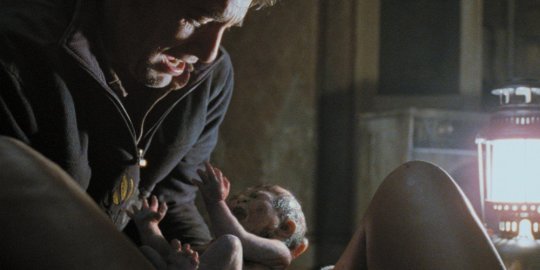
Children of Men was a universally celebrated sci-fi movie when it debuted, in large part due to its visceral vision of a dystopian future. In a time when children aren't born due to infertility reasons, one man must protect the last child of humankind and defend it from a myriad of dangers.
RELATED: 10 Sci-Fi Movies To Watch If You Like Children Of Men
The last baby that Clive Owen's character protects wasn't a real baby at all due to the hazardous nature of the scenes it was featured in (especially him running and jumping across rooftops or amidst gunfire). Therefore it was necessary to use a CGI baby that's so life-like it fooled audiences completely.
4 Indiana Jones And The Kingdom Of The Crystal Skull

While most wouldn't classify Indiana Jones and the Kingdom of the Crystal Skull as a sci-fi film, the ending would solidly place it in that category. It features the beginning of the Atomic Age, and positions Indy in a world that's beginning to become completely immersed in what lies among the stars.
RELATED: Indiana Jones 5: 10 Scrapped Ideas From Previous Sequels It Should Use
In the opening sequence involving two hot-rods racing (a 1950 Ford Deluxe Army Staff Car vs a 1932 Ford Model B Roadster), one of them rides over a gopher hole. The little critter almost gets himself decapitated by the Model B, before scampering off. That gopher was entirely CGI...for some reason.
3 Waterworld
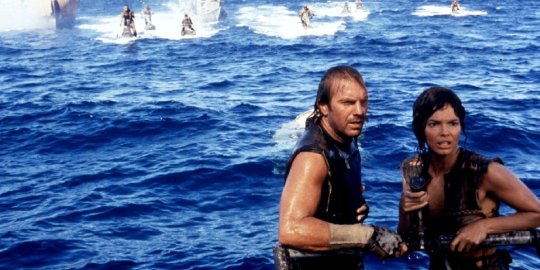
Waterworld was an ambitious project, some would say too ambitious for a sci-fi film. It was plagued by every conceivable problem on set, had an incredibly bloated budget, problems filming on oceanic locations, as well as hazardous working conditions. It also spent a hundred thousand dollars on making the ocean CGI.
Despite the fact that aerial shots exist, there are scenes in Waterworld where the ocean is CGI, and while it looks fantastic, this contrasts pretty spectacularly with shots of the real thing. This is why the budget ballooned from $100 million to $175 million.
2 Supernova
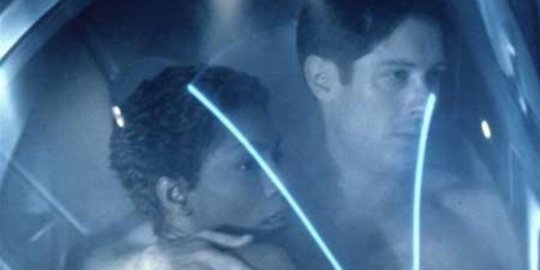
It's General Hospital, in space! Or it's Supernova, a sci-fi thriller that positions a hospital ship in deep space. Their continuing mission? To answer intergalactic 911 calls. When the Nightingale 229 answers a distress call from another ship, the survivor they bring on board and his alien artifact may trigger a supernova that will wipe out the galaxy.
RELATED: 10 Weirdest Places That Movie Characters Have Sex
Before that catastrophic event happens, there's time for a little hanky-panky. In zero gravity, Angela Bassett and James Spader's character have a sex scene, except they weren't on set to do it. It's really their co-stars, Peter Facinelli and Robin Tunney, with Tunney's skin tone altered in post-production to match Bassett's.
1 Return Of The Jedi
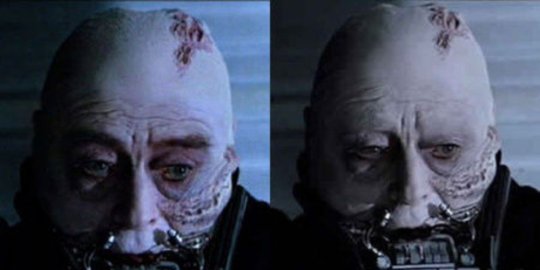
While some Star Wars fans found things to gripe about in the original trilogy's third installment it was, on the whole, a fitting climax to one of the most beloved saga's in sci-fi history. George Lucas would later come out with a trilogy of prequels for Star Wars fans to complain about and, armed with new advancements in CGI, he would go back and alter their beloved film. If you've never seen any other version of the film, you may think the alterations were normal.
When Luke takes Vader's mask off so he can see his son with his own eyes, we see that Vader has no eyebrows in the 2004 Blu-Ray edition. This is because Lucas felt they should've been burned off on Mustafar where he sustained the injuries that put him in the mask to begin with, so CGI was used to remove them. Too bad he didn't stop there...
NEXT: 10 Amazing Movie Scenes That Did Not Use CGI
source https://screenrant.com/sci-fi-movies-cgi-surprise/
0 notes
Quote
Every now and then a conversation sparks up round the water cooler at TGAM Towers that goes along the lines of someone asking "So is gaming mainstream yet?". Hours, insults, fisticuffs and a reminder on policy on worker in the work place later, inevitably the conclusion is a firm not yet.
We're not expecting an overnight transformation. But what would it take?
We have game inspired video games at the Box Office (okay so they're rarely great), Final Fantasy menus in restaurants, Splatoon and Pokemon collaboration ranges with Uniqlo, LEGO collaborations with Blizzard, Midway and SEGA. Museum exhibitions on video games, design and art. Gaming content seemingly dominates large swathes of the Internet from Youtube through to Youporn. Yet admitting that you choose to spend your time playing video games every now and then still feels, in the UK at least, akin to admitting that you strictly only eat the faces of babies because that's where the softest meat is.
When Does This Pre-Amble End?
When it comes to the real world, specifically the high street, video games themselves have virtually no presence at all. In fact it's got worse since our budding interest grew in the 1990s. Arcades are all but dead, few cities have a dedicated game retailer (you might be able to find a grotty copy of NBA 2018 in one of those laptop/mobile repair shops), major supermarkets stock perhaps 4.5 games and media stores in general are critically endangered. TV never manged to 'get' gaming and even though Esports is making huge strides it's still not managed to topple the likes of darts, snooker and cricket from their prime time perches (or even get broadcast at all away from the Internet).
When we first got into gaming we'd wet our pants even when video games penetrated the mass media in the lamest ways from those Lucozade Tomb Raider ads. to the awful why-can't-anyone-crack-gaming-content-on-TV shows and even feigning support for those Resident Evil films when there was frankly nothing else on the horizon.
However, now that Netflix is a national sport we're almost drowning in a rich and diverse soup of game-related content. Most of which is total pants. Some of which is bonkers and dare I say some might even have appeal beyond those who would call themselves a gamer (and cringes at the same time because nobody over the age of 12 unironically calls themselves a gamer). Gaming content is so prevalent on Netflix, it even has it's own category, two in fact! Does this mean gaming is mainstream yet? No you babyface eating monster it doesn't are you mad?
Gaming Shit Currently on UK Netflix (Alphabetically)
The Adventures of Super Mario Bros. 3 Okay so for all the hype up top, a lot of this stuff is cheesy kid's cartoons. This is a 30 year old cheesy cartoon loosely based on that hot new video game release Super Mario Bros. 3 and although a smidgen better than the Super Mario Bros. Super Show.... it's amazing this franchise didn't just die in the 90s. Remember King Koopa and Princess Toadstool? 13 episodes. 13 episodes too many.
Angry Birds Can any lawyers out there help? Is there some EU mandated law that means video game tie-in media has to come out decades after the thing it is based on became culturally irrelevant? Three seasons of this steaming mess and I've not got to the will to work out if this is related to the movie, the sequel movie out THIS YEAR(?), the toons series or how it will fit in with the WHO IS ASKING FOR THIS CONTENT 'long form' cartoon out in 2020. For those of you younger than 10, i.e. the target audience for this stuff, Angry Birds used to be a video game.
Black Mirror Sometimes very video game inspired, sometimes not, this series makes us question our relationship with technology makes us feel even worse for prodding a phone screen and writing swears to other 14 year olds online. Recommended watching but not all in one go mind.
Castlevania Supposedly a decent anime version of the games. I've not watched all of it because I only played Castlevania 64 and Dawn of Sorrow and if you don't understand who any of the characters are, it's reaaalllly slow and boring. Worth a try if you actually have engaged with the critically acclaimed series unlike us.
Digimon Fusion Ergh. Dirty. No. Bad Mega Bloks. No.
Dinosaur King Ahhh dinosaur games. Archaeologists have found ancient scrolls that record the Dinosaur King was actually a video game and collectible card game from 2005. This is the series from 2008 that absolutely is not based on Pokemon at all and mixes anime style and really really bad looking CGI.
Final Fantasy XIV: Dad of Light Okay, this series is actually brilliant. Remember how Pinball Wizard was a feature movie advert for Super Mario Bros. 3? Well this is a series length advert for Final Fantasy XIV told through the heart warming story of an awkward Japanese man and his awkward relationship with his awkward recently retired Dad and he tries to rebuild that relationship by getting him into Final Fantasy XIV because they used to play Final Fantasy together. Each week is a new challenge as his Dad quits because of a mechanic he doesn't understand that helpfully his son and his guildmates help explain. Passable on it's own but elevated to must watch by a few scenes that use familiar Final Fantasy sounds that get this glorified advert tugging on the heart strings.
Halo Shit Includes Halo 4: Forward Until Dawn, Halo Legends and Halo Fall of Reach. The first one is live action and frankly awful. Legends is to Halo what Animatrix was to the Matrix and worth a watch. I've watched Halo: Fall of Reach six or seven times and I can't tell you what happens so try it perhaps?
Hi Score Girl Weird anime homage to early arcades told through the relationship of a nerdy arcade kid and an aloof posh girl who is very good at video games but not allowed to play them at home. Watch if you you always wondered about turtling in Street Fighter 2 but didn't actually look it up in the last 30 years. Probably very nostalgic for 30 something Japanese gamers. Which isn't us.
Ingress the Animation I've impressed myself that I didn't miss this. Remember Ingress the AR mobile game that nobody had heard of until it got a Pokemon Go reskin? No neither did I. Well apparently someone along the way believed so strongly in the Ingress vision that they commissioned an anime series in 2018. Really slow. Extremely Japanese. If the game was anything like this then we can understand why nobody has heard of it.
Kingsglaive: Final Fantasy XV (NO LONGER AVAILABLE) This appears to have been pulled which is a shame as it was alright. Apparently, I'm reliably told the events of this film are really important to the context of the game and only told in this film. Errr tough anyway you missed it here.
Minecraft Story Mode Fuck off.
Pacman and the Ghostly Adventures Perhaps takes the award for being the least relevant television tie-in ever. We got two seconds in before reaching for the revolver and the sweet release of a bullet kiss to the brain. All the tropes of Saturday morning cartoons with none of the charisma. Remarkably there's also a Halloween and Christmas Merry Berry short to make both of those holidays even more intolerable. Brilliant soundtrack though.
Pixels Probably the best worst video game related movie of all time. I'm not sure who the audience was when it came out and with each year gets more and more obscure. It stays the same amount of crap though which is a lot of crap.
Pokemon Want to watch only the first and last series of the anime and whatever random films seem to be on Netflix at the time? Knock yourself out. For us this is the UK being shit at commercialising this shit at its worst. Its very worst. The entirety of Pokemon has never been available in the UK at the same time ever. We never got VHS/DVD releases for most series or cinematic releases for some of the films. The Pokemon TV app frustratingly cycles episodes in and out and bizarrely Netflix is missing the middle 91 seasons and the first 38 films. It doesn't fucking matter anyway every episode is the same except the latest season where every episode is the same but set in a school BECAUSE WE'RE ALL CHILDREN AND WE FIND SCHOOL SUPER RELATABLE. There's also a creepy birthday video, hilariously with characters from a season otherwise not available on Netflix. Is it too much to ask to employ one person part-time to curate this shit?
Rabbids Invasion File under striking whilst the iron is... you know what, I can't hate on the Rabbids. I really want to but honestly they're brilliant and most of their games are too. Probably brilliant. Strangely only the 4th season is available...?
Red Vs Blue The series that built the house of goofing around in games. Early seasons have not aged well at all. How did we put up with the awful sound and even worse 'plot'? 124 seasons of this madness though so if you're in palliative care and want to speed things along...
Resident Evil: Afterlife Hysterically, only the middle film is available serving the incredibly niche audience of people who like the Milaverse Resident Evil films but are four films behind.
Skylanders Academy Remember the smash hit wallet biting Toys to Life game series that ran itself and all the imitators into the ground from 2011 to 2016 and now fill attics and sheds the world over? Well now you can enjoy the 2018 animated series with all handfuls of your favourite characters. Set in a high school. There's also a weird 1 minute long happy birthday message thing that a lot of the kid's shows have done on Netflix so if you really hate your kid and want to let them know you should show them that on their birthday I guess.
Smosh the Movie Is this video games? They look cuntish enough to be Youtubers and this movie is exactly as awkward as you'd expect when Youtubers try to do something proper with make up, production values and nice cameras. Like that *cringes* Game Grumps series. Or when that *mega cringes* green haired kid did that Fortnite dance at that thing. Suggested watching if you're need that extra push to do the right thing and end yourself before it all gets a bit Fallouty round here.
Sonic Boom This is the weird one that all the furries like.
Tomb Raider I think the rebooted film before the current reboot? Is casting ladies from the North of the UK to be Lara Croft still a thing? In this movie Lara Croft, I kid you not, is a Deliveroo driver and... it does pick up from there but in a very formulaic and inoffensive kinda way.
Video Game High School (NO LONGER AVAILABLE) And be fucking thankful. What if instead of lessons at school you played different video games? Live action series with hands down one of the worst cast of actors of all time. Ridiculous premise (which of course later sort of became real with several Universities running esports programmes) glad it got removed to be honest.
Yokai Watch The new new Pokemon with 80% less appeal. Not 100% sure the game series is still going.
Children's Shows and Toilet Contents
So there we have it. No doubt there's a few I missed and some of this may have disappeared by the time you're reading this. A rich smorgasbord of children's cartoons and questionable content that got a pass because it's video games. At the time of writing, there's virtually no adult content and currently no documentaries. Which is a shame.
If they wanted, Netflix could become the de facto place for curated traditionally produced gaming related content from Street Fighter live action movie and animated series, the CG Resident Evil Films, Pinball Wizard, King of Kong, Silent Hill one and two, the Dead Space films etc. etc. Instead it seems that they're content to maintain this weird ever changing half complete line up of irrelevant at launch factory manufactured kid's shows and single films from a series.
Perhaps they are right though, there's no point competing with YouTube and Twitch which now host infinity hours worth of quality content that gamers are already spending millions of pounds on supporting. Is gaming mainstream yet? Looks like we need to wait until one of the grumpy white middle class hacks at the Guardian produces an op-ed on why they're giving up on Rabbids Invasion despite everyone at dinner parties talking about it or how Smosh the Movie made them bicurious one evening.
It's perhaps better to stay in the margins of the old media whilst defining new media (at a ripe young 40), after all REALLY PUNCHY FINISHER. Right?
http://www.thatguys.co.uk/2019/07/gaming-shit-on-netflix.html
0 notes
Link

Age Of HeroesWith Age Of Heroes, Tom Breihan picks the most important superhero movie of every year, starting with the genre’s early big-budget moments and moving onto the multiplex-crushing monsters of today.
“The Marvel Universe has gone nuts; we’re going to have a fricking Captain America movie if we’re not careful.” This was Zack Snyder speaking to Entertainment Weekly in 2008. Every once in a while, that quote finds itself recirculated online, evidence of Snyder’s philistine ideas about superhero movies and what a misguided idea it was for DC to recruit him to attempt to replicate the Marvel Universe’s success. (Another Snyder line from that same breath: “And Iron Man—$300 million domestic box office on a second-tier superhero!”)
It’s unfair to Snyder to use that quote out of context. If you read the whole interview, Snyder is, if anything, excited about Marvel’s success, if only because it proves that “pop culture is just, like, so ready for Watchmen,” the movie that he was promoting in that interview. (Note: Pop culture was not.) Snyder was simply showing his own surprise about how quickly and completely superhero movies had taken over, something that would only snowball in the years after that. Also, that Captain America movie was already in development when Snyder said what he said, and Snyder probably already knew that. (The whole Snyder interview is, however, a deeply entertaining and insane historical document. Dismissing the idea that Batman Begins is a dark movie, Snyder notes that Batman “doesn’t, like, get raped in prison. That could happen in my movie. If you want to talk about dark, that’s how that would go.” Eight years later, Snyder would make a Batman movie that did not feature Batman getting raped in prison.)
Here’s the thing: Even if Snyder had been dismissing the idea of a Captain America movie, he would’ve been totally right. Before there was a Captain America movie, there was no evidence that a Captain America movie would ever work, on any level. The entire idea of Captain America—a square-jawed avatar of everything great about the US of A, a guy who intentionally makes himself look like a big flag—seemed almost hopelessly hokey and anachronistic in 2008, when Snyder said what he said. There was nothing dark or gritty or sexy or intense about Captain America. He was a symbol of a time that never existed—an advocate for the greatness of a country that, at least on a geopolitical scale, has long been a globally dominant hegemon rather than a scrappy and idealistic underdog. Even Captain America, the comic book hero, wasn’t so sure about Captain America, the symbol of American pride. In a ’70s comic book storyline, Steve Rogers, disgusted after learning of governmental evil, had briefly forsaken his own identity, instead becoming a costumed adventurer named Nomad. If Captain America himself wasn’t so sure about Captain America, how could Hollywood be?
The 1990 Captain America movie had been such an outright catastrophic failure that it just barely got released. In the years after that, internal debates about America’s role in the world had only heated up. A Captain America movie could’ve gone wrong in so many different ways. It could’ve gotten caught up in post-9/11 Toby Keith jingoism. It could’ve played out as a goofy parody, a broad satire of Dudley Do-Right postwar heroism. It could’ve been another crappy, interchangeable Fantastic Four-level superhero movie, just with more shots of billowing flags. Instead, Captain America: The First Avenger turned out to be the movie that, at least from where I’m sitting, ultimately made the whole Marvel Cinematic Universe experiment work. It took some unbelievably skillful needle-threading to make it happen, but the people at Marvel managed to turn Cap, the personification of corniness, into something like a beloved cinematic icon, the soul upon which all of the MCU rests.
There was groundwork. A new Captain America movie had been in the planning stages since 1997; lawsuits and financial issues had stalled it. When the project finally got going, Marvel had done a few interesting things with the character. Ed Brubaker had built a complex and masterful noirish espionage saga around Cap in his Winter Soldier storyline, while Mark Millar’s blockbuster Civil War event had delighted in its depiction of Steve Rogers as an inspiring and charismatic leader and as someone who would defy his own government if he thought it were straying from the country’s true ideals. (In both Millar’s book and in the Civil War movie that eventually came out of it, Cap is wrongheaded and shortsighted, but that’s an argument for another day.) Captain America: The First Avenger only alludes to those comic book visions of the character, which later movies would explore more thoroughly. But if you were actually reading comics at the time, it was clear that Captain America, in the right hands, could be a layered and fascinating character.
Ultimately, the movie works because Marvel hired the right people. Director Joe Johnston was a longtime journeyman with an inconsistent record and at least a few genuinely bad movies on his résumé. (Shout-out to 2010’s The Wolfman.) But he was also a veteran special-effects guy who’d worked on Star Wars and Raiders Of The Lost Ark, which means he was comfortable with the levels of visual trickery needed to make a story like that work. And with his own 1991 movie The Rocketeer, he’d nailed exactly the kind of old-timey adventure-serial energy that a Captain America movie would need. (He even had powered-up Nazi villains.) It’s hard to imagine anyone more qualified for the job.
It’s also hard to imagine a better Captain America than Chris Evans. Evans had already been around the superhero-movie block before taking the role. He’d done what he could as a devil-may-care playboy version of the Human Torch in two near-unbearable Fantastic Four movies. He’d been a superpowered test-subject mutant at war with shadowy governmental agencies in 2009’s misbegotten Push. He’d lampooned his own absurd handsomeness in the superhero-adjacent Scott Pilgrim Vs. The World. He’d never really had much chance to be anything other than a life-size Ken doll. But he had a depth to him, and with Captain America, he finally got the chance to show it.
Evans had to be convinced to take the Captain America role, and he’s always hinted at a little discomfort with it. But he’s perfect. He’s warm and friendly and inspiring—all the things that Captain America is supposed to be. He spends so much of The First Avenger as a scrawny weakling—a special effect much more convincing than it probably should’ve been—that he has to find non-physical ways to project his own idealistic determination. And he does it. The sight of digitally shrunk Chris Evans refusing to back down after a beating from a movie-theater heckler—fists clenched, jaw bloodied, “I could do this all day”—remains one of the most indelible images that the MCU has given us. When he finally does balloon out to superhuman proportions, we’re already on his side. Throughout the movie, he struggles against his own propaganda utility, fervently and innocently trying to get out into the field and help his comrades.
Like Christopher Reeve’s Superman, Evans radiates genuine Boy Scout virtue, and he comes off as an anachronism even in the ’40s. The movie doesn’t joke about him or make him an object of fun. Instead, the movie is just as gee-whiz idealistic about Captain America as Captain America is about America. Even a hint of acid, sarcastic self-consciousness could’ve sunk the movie. In Evans, it has none.
Johnston and the producers built an impressive cast around Evans. As Agent Peggy Carter, Hayley Atwell brings a clipped Katharine Hepburn precision that’s enormously appealing. (The short-lived Agent Carter ABC spinoff, which kept that First Avenger tone intact, remains Marvel’s greatest TV project.) The grumpy authority figure is just Tommy Lee Jones playing Tommy Lee Jones. As Cap’s buddy Bucky, Sebastian Stan is a pleasant slab of beef, which is all he needs to be. Stanley Tucci has fun as the good-guy version of a mad-scientist character.
The only real weak point in the movie’s cast is Hugo Weaving, whose Red Skull has less fleshed-out humanity than Agent Smith, the computer program that Weaving played in the Matrix movies. Even Red Skull’s motivations are muddy. He tells Cap, his fellow super-serum test subject, that he’s “too afraid to admit that we have left humanity behind,” like a K-Mart-brand Magneto. Also: “I have seen the future, Captain! There are no flags!” I don’t know, that sounds pretty good, though it would presumably sound better if a muscle-faced fascist sorcerer wasn’t the one invoking it. (The Red Skull doesn’t even get a satisfying end. When he showed up in a quick surprise cameo in Avengers: Infinity War, I’d completely forgotten that he’d been sucked into a wormhole or whatever. It happens so quickly that you barely process it.)
The movie’s version of ’40s America is a blast. Many of the characters are just as gung-ho as Cap himself. When a HYDRA agent tries to slow Cap down by throwing a little kid into the Hudson, the kid squawks, “Go get ’im! I can swim!” Natalie Dormer, a year away from becoming Margaery Tyrell on Game Of Thrones, gives Cap a big situation-complicating smooch because she likes that he saved a bunch of guys (and also, presumably, because he looks like Chris Evans). In a quick montage after Cap’s apparent death, we see all of America uniting behind him as a martyr and a legend. It’s a comforting vision of a better, simpler version of America.
It’s probably too comforting. The movie only barely alludes to racial inequality in America. When Cap puts together his crack team of commandos, they’re a rainbow coalition, and nobody acts like that’s weird. I wasn’t around in the ’40s, but given what I know, that seems unlikely. I think the movie might’ve been more effective if Cap had seen and wrestled with America’s failures. The same is true of the ravages of warfare. None of the soldiers ever seem freaked out or traumatized. Instead, they just charge into battle, oblivious to their friends disintegrating all around them. (If the Red Skull’s magical weapons didn’t allow for bloodless, PG-13 death, some of those skirmishes would’ve looked like the beginning of Saving Private Ryan.)
In the movie’s second half, when it turns toward action, The First Avenger becomes a pretty generic (though well-done) superhero punch-up. A lot of the storytelling is clumsy and inelegant. At one point, Cap is suddenly in a motorcycle chase with Nazis, with no real setup and little indication of why he’s there. Most of the fight scenes are too CGI-heavy to be truly great, and a few of the effects scenes, like Bucky’s fall from the train, just look like ass. The big finale, when Cap wakes up in a decades-later New York City, is clearly just setup for the next movie, which means The First Avenger can never really stand as its own cohesive story. It’s not a perfect movie. There are real flaws.
But it’s also an elegant piece of myth-building, and small connections to the rest of Marvel enrich the whole world we’re seeing take shape. We meet Tony Stark’s father, a tycoon adventurer who connects the dots between Howard Hughes (who Johnston had depicted in The Rocketeer) and Stark himself. HYDRA science worm Arnim Zola first shows up as a face on a screen, a role he’ll grow into. Before getting his iconic shield, which honestly looks pretty great, Cap fashions one for himself out of a trash-can lid and a ripped-off car door. Marvel wouldn’t bring all its characters together for another year, but little touches like this make it a fuller experience.
Captain America: The First Avenger was a hit, but it wasn’t a huge one. It wasn’t one of the top 10 grossers of 2011; the same year’s decidedly shittier MCU entry, Thor, made more money. And yet it’s a crucial movie for the MCU, since it showed just how much fun this whole Marvel superhero business could be. After the initial miracle of 2008’s Iron Man, Marvel had made three straight movies that were not special at all. There are things worth appreciating in The Incredible Hulk, Iron Man 2, and Thor, but none of them really demonstrates why this whole world matters to people. Captain America: The First Avenger made that case. And if it had failed in any of the myriad ways that it could’ve failed, the present-day movie landscape would presumably look very, very different.
Other notable 2011 superhero movies: Kenneth Branagh’s aforementioned Thor got one thing exactly right: Chris Hemsworth, who looks like a Michelangelo sculpture of a lion-man and who brings a crazy level of life to what was then an underwritten role. But the movie itself is a bore, full of turgid fantasy gobbledygook and thin CGI and sub-Crocodile Dundee fish-out-of-water jokes. The central love story is so across-the-board half-assed that it practically insults both Hemsworth and the paychecking-hard Natalie Portman, and even Tom Hiddleston’s slithery Loki is really only a rough draft for what would come.
The First Avenger wasn’t the only Marvel adaptation to go period-piece. Matthew Vaughn’s X-Men: First Class tried to make a swingin’ ’60s espionage thriller out of a prequel, which works pretty well. The cast—James McAvoy, Michael Fassbender, Jennifer Lawrence—is almost hilariously overqualified, and while the period details never reach the full Mad Men-style immersion they were clearly shooting for, they’re fun enough. The CGI remains terrible, which for whatever reason is true of almost every X-Men movie. Whenever (speaking of Mad Men) January Jones’ Emma Frost turns into her diamond form, she looks like a Virtua Fighter character. This was a series bounce-back after the putrid X-Men Origins: Wolverine, but it was also a clear sign that the non-MCU Marvel movies would never be the main event.
2011’s notorious boondoggle was, of course, Green Lantern, a movie that managed to be a self-aware punchline in two different 2018 superhero movies, Deadpool 2 and Teen Titans Go! To The Movies. (As I’m typing this, I haven’t seen Aquaman or Spider-Man: Into The Spider-Verse yet, so it’s entirely possible that even more 2018 superhero movies will make fun of Green Lantern.) It is a 10 ten-car pileup of a movie. A post-Deadpool and pre-Deadpool Ryan Reynolds attempts to smirk his way through everything, Van Wilder-style, while the writers build a whole interstellar cosmology that somehow comes off both thin and over-developed. Various respected character actors submit themselves to the indignity of bad alien makeup. (In particular, Peter Sarsgaard, a very handsome man, falls victim to makeup-artist ambitions.) You can almost see Tim Robbins and pre-Black Panther’s mom Angela Bassett thinking, mid-scene, about how they’re going to spend the money that this bullshit is getting them. Also, Future Thor: Ragnarok director Taika Waititi is in there in the nerdy tech-head comic-relief sidekick role? Altogether, Green Lantern makes for a great lesson of what can happen when you try to combine intelligence-insulting children’s entertainment with detail-heavy fan service without filling it all out with any kind of resonant storytelling. Also, Reynolds’ CGI super-suit might be the single ugliest costume in superhero-movie history.
And in other chartreuse-misfire news, Seth Rogen’s long-in-development The Green Hornet finally came out and made no impression. There’s certainly plenty of talent involved in the movie. For a while, slapstick visionary Stephen Chow was attached to both direct and to star as Kato, which would’ve been fascinating. Instead, the directing job ends up with Michel Gondry, the sometimes-great homespun music-video fantasist and Eternal Sunshine Of The Spotless Mind auteur. Rogen and his Superbad partner Evan Goldberg get the writing credits. Christoph Waltz played a villain, which is something that Christoph Waltz knows how to do. Cameron Diaz is in there, too, as Rogen’s implausible love interest. You would think that these people could do something great together, but instead it’s just a rote nothing of a movie, one that never quite gets around to demonstrating why it deserves to exist.
Also, it’s not really a superhero movie, but I remember thinking that Steven Spielberg’s feature-length CGI cartoon The Adventures Of Tintin was a lot more fun than its reputation would suggest. I have not revisited it.
Next time: In January, this column will tackle The Avengers, the long-planned corporate-crossover blockbuster, which kicked the MCU into high gear and proved just how entertaining this kind of movie, when executed just right, can be.
0 notes
Text
30 Years of Akira: The Triumph and Legacy of a Legendary Film
A city of the future then, and of the “now” today. An oppressive metropolis lined with flashing neon. Relentlessly tough streets ravaged by teenagers consumed in a cycle of violence and debauchery intrinsic to their dystopian society, an ethos of cataclysmic revolution seeping up through the sewer grates and into the street.
Akira's Neo-Tokyo is an accomplishment unique amongst anything else in anime. For 30 years it has stood as a testament to why Akira remains remembered amongst its contemporaries. Thanks to this vivid locale and its inhabitants, the monumental film caught the eye of Western audiences, turning anime into a worldwide phenomenon. On this milestone anniversary, let’s explore the influence of the masterpiece that changed anime forever.
The roots of Akira trace back to director Katsuhiro Otomo’s childhood fascination with mecha manga Tetsujin 28-go. He took direct inspiration from its story about the resurrection of a dangerous world-destroying superweapon. To cement the connection between the stories, Otomo named Kaneda, Tetsuo, and Akira after their Tetsujin 28-go counterparts. The director also looked to his own observations of Tokyo to build the foundation for the film. From political demonstrators to gangs of delinquents, he imagined the people he saw in a future world where they’d be free of the law, thus giving birth to Neo-Tokyo.
However, Otomo found that conveying the atmosphere and detail of his fictional city was incredibly challenging in manga form. In his words, “It is extremely difficult to express the depth of such a vast city. In the comic, I used each issue to build more depth and size. But in a film, you get to combine this all into one. It’s much more convincing... I could really create the type of environment that I wanted to depict.” While at first he expressed trepidation about adapting Akira to anime due to a past bad experience, he agreed after being granted full creative control; he would both direct and write the film.
How was one to cram an (at the time unfinished) 2,300-page manga into two hours of animation, though? Otomo’s answer was to drastically alter the story, retaining the feel and themes while changing plot points and entire characters for the sake of truncation (for example, Akira was far less benevolent in the manga). Many call the film a mess with its tendency to forget characters and contradict itself. Even Otomo himself thought the film to be a failure on initial viewing due to budget cut compromises. Yet his original intuition about why film was the right medium for Akira turned out to be correct: its intricate worldbuilding overshadowed any plot-based shortcomings. New heights of animation and a deep color palette (setting a record for number of colors used at its time) gave life to a cyberpunk locale so vivid that it felt real. The lawless metropolis became a place of pure escapism, even if in reality you would never want to live there. It was by focusing on his reason for wanting to turn Akira into anime in the first place – feeling animation would beter sell the city's scope – that Otomo made an impossible adaptation possible.
At the time of Akira’s release, anime was still an unknown quantity to much of the world outside of Japan. Western audiences were used to animation being strictly for kids through the work of Disney and their contemporaries. So Akira stood in stark contrast to those beliefs. The brutality of Neo-Tokyo was unlike anything else people had seen, depicting violence and destruction on a pulpy level that live action couldn’t. This led to expected backlash stereotyping anime as degenerate until the arrival of Pokemon and Spirited Away over a decade later. However, it also cultivated an instant fanbase hungry for more Japanese cartoons that challenged what was possible in storytelling. Akira became a counter-culture icon, a tale of revolution by way of anarchy. It didn't follow the rules of what was publicly acceptable. While many mistook it as a depiction of how teenagers wanted to act, what it really elicited was how they felt.
Anime didn’t reach the heights of Akira’s $80 million box office pull for some time, despite this newfound interest. Ghost in the Shell – the next anime film to garner mainstream attention – did a respectable $10 million yet failed to recoup its costs. But, in the long term, the seeds of the medium’s success were sown. Akira would inspire the likes of Neon Genesis Evangelion and contemporaries in Japan, and The Matrix, Kill Bill, and much more overseas. A live-action version is even still being shopped around Hollywood, and though the it sits in limbo due to budgetary concerns, directors continue to line up for the chance to remake a film that inspired them.
Akira broke ground across the board in bringing Neo-Tokyo to the screen. It’s no wonder that the film is still remembered as a shining beacon of what anime can be years later. So, happy 30th birthday, Akira! Let’s just hope the 2020 Tokyo Olympics you eerily predicted don’t bring about the same result.
---
Tim Rattray (@timrattray) is a features and video writer for Crunchyroll and founder of Thoughts That Move.
0 notes